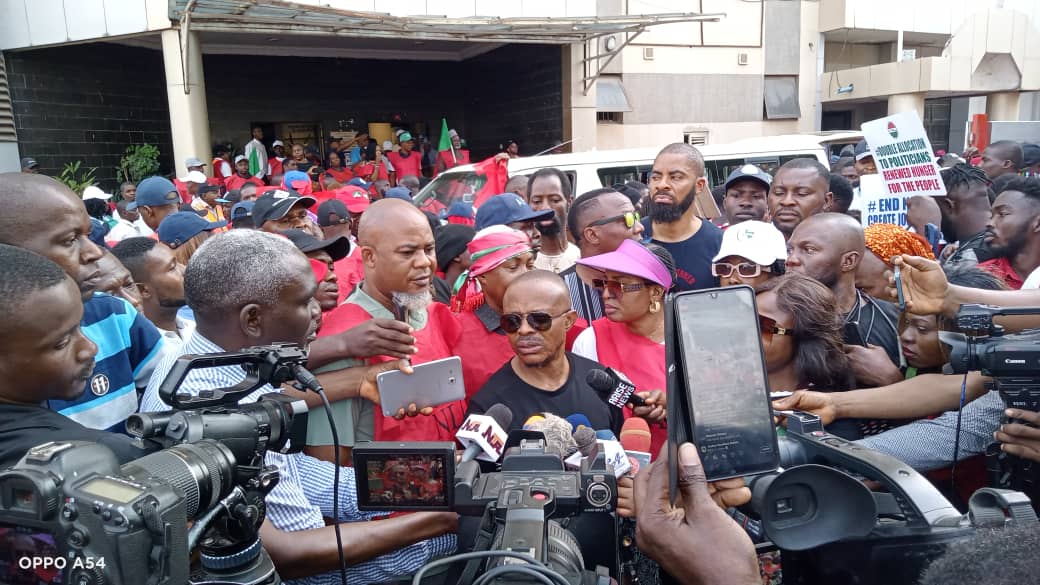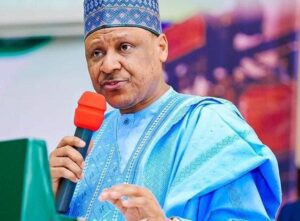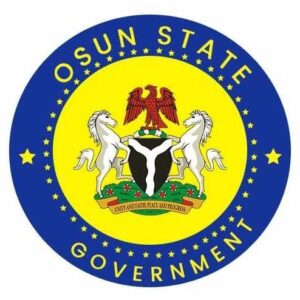
Labour rejects ‘starvation wage,’ insists on N250,000
…Says further strike action depends on Tinubu’s decision
By Opeyemi Abdulsalam
The Organised Labour has rejected the N62,000 offer by the federal government and proposals by some individuals and economists of N100,000.
Recall that the Nigeria Labour Congress (NLC) and Trade Union Congress (TUC), had embarked on the strike after negotiations with the federal government on a new minimum wage hit a brick wall.
The NLC and Trade Union Congress (TUC) had on June 4 ‘relaxed’ their nationwide strike for one week.
Recall that the relaxed strike, which is imminent to resume again, has sparked concerns about the potential disruption of critical sectors, including ports, national grid, transportation, and healthcare.
The organised labour had repeatedly proposed N615,500 and N494,000 as the new national minimum wage, which the government said was unrealistic.
Recall that the federal government had on June 7 increased its offer for the new minimum wage for workers from N60,000 to N62,000 but the labour unions insisted on N250,000 at the last meeting of the tripartite committee on minimum wage as the living wage for an average Nigerian worker.
Meanwhile, governors under the aegis of the Nigerian Governors Forum (NGF) have said the N60,000 minimum wage for workers is not sustainable.
Last week, workers of the Transmission Company of Nigeria (TCN) shut down the national grid when the Nigerian Labour Congress strike action kicked off.
The shutdown threw the entire nation into darkness forcing many businesses and individuals to resort to generators.
Earlier on Monday, Nigerian citizens took to social media to implore the labour union not to disrupt the national grid during any potential strike action.
But in the early hours on Monday, the NLC rejected the government’s offers of either N62,000 or N100,000 as the new minimum wage, with Assistant General Secretary Chris Onyeka describing these figures as a “starvation wage.”
“Our position is very clear. We have never considered accepting N62,000 or any other wage that we know is below what we know can take Nigerian workers home. We will not negotiate a starvation wage,” Onyeka stated in an interview on Monday.
The NLC has maintained its demand for a N250,000 minimum wage, which Onyeka termed “enough concession to the government and the other social partners in this particular situation.”
Reacting on Monday, the President of Nigeria Labour Congress (NLC), Joe Ajaero, ruled out strike action today, Tuesday, to press for a new national minimum wage.
Ajaero spoke at the International Labour Conference (ILC) organised by the International Labour Organisation (ILO) in Geneva, Switzerland.
He clarified that the submission of N62,000 as proposed by the government and the organised employers’ body with labour proposing N250,000 does not translate to labour accepting N62,000 as the new minimum wage.
He said, “The tripartite committee submitted two figures to the President. Government and employers proposed N62,000 while labour proposed N250,000. We are waiting for the decision of the President. Our National Executive Council (NEC) will deliberate on the new figure when it is out.”
On the expiration of the one-week ‘relaxation’ of the suspended strike that is expected to resume on Tuesday, Ajaero said, “We cannot declare a strike now because the figures are with the President. We will wait for the President’s decision.
“During the tenure of the immediate past President, the figure that was proposed to him was N27,000 by the tripartite committee but he increased it to N30,000. We are hopeful that this President will do the right thing. The President had noted that the difference between N62,000 and N250,000 is a wide gulf.”
The NLC president also berated the governor of the 36 states under the umbrella body of the Nigerian Governors’ Forum for rejecting the N62,000 saying, “How can any governor say he cannot pay?
“They cannot also be calling for the decentralisation of the minimum wage.
“Are their wages decentralised? Governors whose states are not contributing a dime to the national purse and who generate pitiable Internally Generated Revenue (IGR) are collecting the same amount as governors whose states are generating billions of dollars into the FAAC.
“They should decentralise their salaries and emoluments first. So, where is the governor of Edo state, Godwin Obaseki getting his money from? He is paying N70,000 minimum wage. This is the type of governor that should be emulated and not the lazy ones.”
Recall the ‘relaxed’ strike had far-reaching consequences for the economy. The Labour Unions operating in the nation’s aviation sector, complied fully and shut down airports across the country. The seaports, which handle a significant portion of the country’s imports and exports, were shut down, leading to disruptions in global trade.
The national grid, which provides electricity to households and industries, was also affected, leading to widespread power outages.
Other critical sectors, such as transportation, healthcare, and education, were also impacted, leading to a complete paralysis of the economy.




